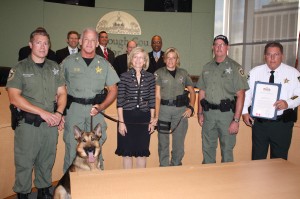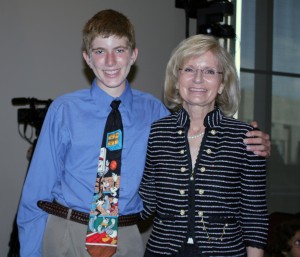By TED JACKOVICS | The Tampa Tribune
Published: August 14, 2011
TAMPA Victor Crist stunned colleagues on the Hillsborough County Commission and the county’s aviation authority when he proposed cooperative efforts among the area’s seaports and airports that typically compete.
“We need to take a look at how we could benefit the region by thinking differently and cooperatively,” Crist said this year. “The only obstacle would be those who want to hold on to their power.
“We must take baby steps,” he said, proposing discussion of cooperative, regional prospects before endorsing changes to how things are run today.
Crist is in front of elected officials and program managers who generally are reluctant to discuss the politically sensitive topic of rearranging their turf and operations.
Managers point to competitive realities that elected officials create.
But political and fiscal realities require leaders to change the way they think, said Ronnie Duncan, chairman of the Tampa Bay Area Regional Transportation Authority. “The world is different today than yesterday,” Duncan said. “Congress is debating the nation’s budget, and the House already has made clear that less federal money will be available for transportation projects than in recent years.
“All of us from Tampa Bay to California are going to have to do things differently, and that’s not a bad thing.
“What happens in Pinellas stays in Pinellas; what happens in Hillsborough stays in Hillsborough, but that has to change. We have to have those kinds of (regional) discussions.”
Some regional initiatives have been in place for years, such as the Tampa Bay Partnership, which oversees economic development opportunities for eight counties.
The Pinellas and Hillsborough visitors’ bureaus share some marketing initiatives, and the county’s two transit systems purchase buses and equipment under joint contracts to save money.
In 2007, the state Legislature created TBARTA to develop and implement transportation plans in seven counties. But Gov. Rick Scott in May vetoed the re-appropriation of $950,000 to support TBARTA – about 25 percent of its annual budget.
Duncan said TBARTA’s regional mission is needed more than ever, and a new budget will be crafted this month to go into effect in October. “What TBARTA brings is the ability to have a regional discussion,” Duncan said.
Its 16 board members are from a 6,000-square-mile area that encompasses two Florida Department of Transportation districts, two highway toll authorities, three regional planning councils, five metropolitan planning organizations, seven transit service operators and 42 cities.
But it’s the need to trim costs that appears to be driving discussions of regional cooperation.
Republican state Sen. Jack Latvala of St. Petersburg, chairman of the Florida Senate Transportation Committee, this year began exploring how the Hillsborough Area Regional Transit Authority and the Pinellas Suncoast Transit Authority might be combined.
Latvala is scheduled to address HART on the issue this month.
“The push for regional plans for transit is becoming a nationwide topic,” said Alison Hewitt, HART board chairwoman, citing initiatives in the Atlanta and Washington-Arlington, Va., areas among those at the forefront. “But we have to be careful we don’t lose service for our patrons in the quest to combine services.”
Every opportunity to work more closely on a regional basis raises potential problems that must be sorted out, in particular who wins, who loses, who pays, who gains.
Airports
In June, Crist congratulated the new administration at Tampa International Airport on “working diligently to reach across the barriers, whether they be the bay or … silos or turfs that exist within our geographic area.”
His comments took place during a meeting when the aviation authority board approved the airport’s first comprehensive financial-incentive program to recruit airlines to enhance international and domestic service.
That could make recruiting for Pinellas’ airport a little more difficult, Pinellas County officials acknowledge. Historically, the two airports seldom pursued the same service, and the Pinellas visitors’ bureau has opened a $250,000 pot of money that Tampa International could apply to use to generate international flights serving Pinellas hoteliers.
Years ago, Pinellas was unsuccessful in recruiting Southwest Airlines, which chose Tampa International – a departure from its small-airport strategy – in part because Southwest officials were concerned about traffic congestion at the Pinellas airport.
Pinellas was disappointed more recently when the federal government designated Tampa as the area’s destination for Cuba charter flights.
Still, traffic is growing at the Pinellas airport, which last year completed a $21 million terminal renovation project and serves a sizable general aviation and UPS air cargo service. It also hosts the nation’s largest U.S. Coast Guard Air Station.
A third of Tampa International’s passengers are from Hillsborough County, and nearly the same percentage – 31.5 percent of its 19 million annual ridership – is from Pinellas, a 2007 report found.
However, the aviation authority board governing Tampa International is represented only by Hillsborough interests.
That factor has not been an issue, but Crist said he wouldn’t oppose representatives from other counties serving on the authority board if those counties would accept representatives from Hillsborough on their boards.
Aviation authority board member Steve Burton said he encourages regional cooperation, but would leave the issue of board membership to the state Legislature, which created the authority.
Seaports
Even more than the area’s commercial airports, the region’s two major seaports, Port Manatee and the Port of Tampa, have been competitors, with Tampa handling five times more cargo tonnage and all of the region’s cruise passengers.
Crist’s recommendation to seek common ground between the two ports as well as consider the role of the Port of St. Petersburg, which has no cargo or cruise passengers, drew a sharp response from fellow Commissioner Sandy Murman in an April county commission meeting.
“The other ports that you’re talking about, collaboration is good, but honestly, you don’t want to pick up somebody’s deficit,” Murman said. “Things aren’t just as good as some people think they are at other ports, so we have to go about this very cautiously because we are doing so well.”
Crist suggests the strengths of the Manatee and Tampa ports should be considered under the same authority.
Much undeveloped land surrounds Port Manatee, which could be more ideal for cargo than the Tampa port, which has urban neighbors. And Tampa should continue to develop its profitable, cleaner cargo-container business, he said.
St. Petersburg’s port, which leisure boaters use, might host smaller, boutique cruise ships if a market could be developed, Crist suggested.
Mass transit
Transit operations through the Tampa Bay region face myriad challenges.
Hillsborough County voters defeated a sales tax proposal in November that would have funded the area’s first light-rail system and serve as the forerunner for rail in nearby counties.
“The fact is, the Pinellas and Hillsborough transit systems are on life support,” Duncan said. “I think people realize we can’t keep running buses where they carry five passengers where they want to go.”
Latvala is expected to further energize merger or collaboration plans for HART and PSTA this month.
Pinellas County is moving forward with its plan to seek federal money for rail and/or fast bus service that would connect to Hillsborough County via the Howard Frankland Bridge.
TBARTA officials continue to hold discussions about prospects for commuter rail service on CSX Transportation tracks.
TBARTA updated its master plan this year to incorporate freight and cargo transportation and highway plans.
Despite Gov. Scott’s rejection in February of Florida’s high-speed rail project between Tampa and Orlando, vendors remain interested in providing capital for infrastructure, Duncan said.
“Is it feasible for a private-sector company to take over a public transit operation?” he said. “We got our balloons deflated with high-speed rail, the Hillsborough light-rail referendum and other things.
“No one wants to give up the power and ownerships of their domains, but the majority of people want leadership to come up with new ways to fund and operate transportation.
“Yet they are distrustful of government to provide that. We have to have those kinds of discussions.”

